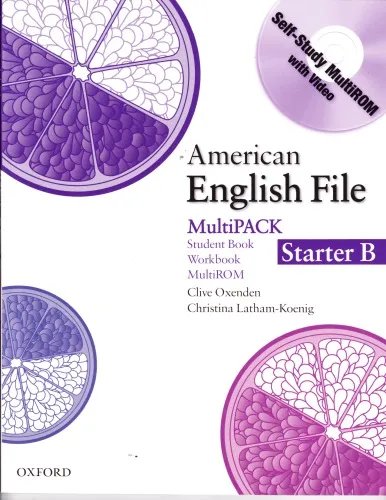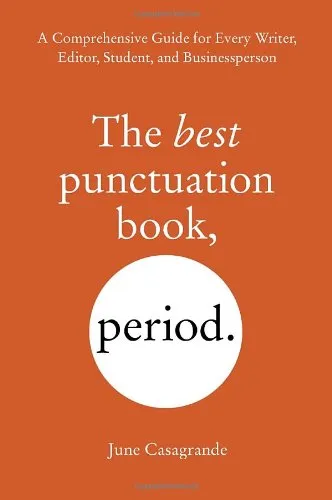Writing Systems: An Introduction to Their Linguistic Analysis
4.9
بر اساس نظر کاربران

شما میتونید سوالاتتون در باره کتاب رو از هوش مصنوعیش بعد از ورود بپرسید
هر دانلود یا پرسش از هوش مصنوعی 2 امتیاز لازم دارد، برای بدست آوردن امتیاز رایگان، به صفحه ی راهنمای امتیازات سر بزنید و یک سری کار ارزشمند انجام بدینRelated Refrences:
معرفی جامع کتاب "Writing Systems: An Introduction to Their Linguistic Analysis"
کتاب "Writing Systems: An Introduction to Their Linguistic Analysis" نوشته فلوریان کولماس، یکی از آثار برجسته در حوزه مطالعات زبانشناسی و بررسی تخصصی سیستمهای نوشتاری است. این کتاب، با نگاهی علمی و دقیق، به تحلیل سیستمهای نوشتاری انسانی پرداخته و تحولات تاریخی، ساختارهای زبانی و تأثیرات اجتماعی این سیستمها را مورد بررسی قرار میدهد. از این رو، این اثر میتواند منبعی ارزشمند برای دانشجویان زبانشناسی، پژوهشگران و حتی علاقهمندان عمومی به زبان باشد.
خلاصهای از محتوای کتاب
این کتاب در چندین فصل تنظیم شده و به بررسی اصول پایهای Writing Systems میپردازد. کولماس، ابتدا تاریخچه و زمینههای پیدایش سیستمهای نوشتاری را معرفی میکند. سپس، او به تحلیل ساختار زبانی هر سیستم و نحوه ارتباط آن با زبانهای گفتاری میپردازد. مفاهیمی نظیر grapheme، phoneme و morpheme به تفصیل توضیح داده شده و نقش این عناصر در تکامل سیستمهای نوشتاری بررسی میشوند.
یکی از ویژگیهای اصلی این کتاب، مقایسه تطبیقی سیستمهای نوشتاری مختلف از جمله alphabetic، syllabic و logographic میباشد. نویسنده در هر بخش به بررسی جزئیات فنی این سیستمها پرداخته و چگونگی انعکاس تنوع زبانی در ساختار نوشتاری را نشان میدهد. همچنین، مبحث encoding در نقشهبرداری زبانی و ارتباط آن با تکنولوژیهای مدرن مورد توجه قرار گرفته است.
نکات کلیدی کتاب
- آشنایی با اصول اولیه سیستمهای نوشتاری و نقش آنها در ارتباط زبانی.
- درک ساختار linguistic systems و تاثیر آنها بر زبانهای گفتاری و نوشتاری.
- تحلیل تفاوتهای اساسی بین Alphabetic systems، Syllabic systems و Logographic systems.
- بررسی تأثیرات اجتماعی و فرهنگی سیستمهای نوشتاری بر جوامع انسانی.
- آشنایی با چالشهای ترجمه زبانی در فضای دیجیتال و encoding.
جملات معروف از کتاب
"Writing is not language, but a representation of language."
"The diversity of writing systems mirrors the diversity of linguistic structures."
"To understand a writing system is to understand the culture and society it belongs to."
چرا این کتاب مهم است؟
"Writing Systems: An Introduction to Their Linguistic Analysis" نه تنها یک منبع علمی بلکه پلی برای درک عمیقتر از تاریخ و تکامل نوشتار انسانی است. این کتاب به ما کمک میکند تا فهم بهتری از نحوه اتصال بین زبانهای گفتاری و نوشتاری بهدست آوریم. علاوه بر این، نقش سیستمهای نوشتاری در ساختارهای اجتماعی و فرهنگی به خوبی در این اثر مشهود است. از آنجا که در دنیای امروز فناوریهای دیجیتال نقش مهمی در انتقال اطلاعات ایفا میکنند، فهم دقیق encoding و توسعه سیستمهای نوشتاری در این کتاب بسیار مفید خواهد بود.
Introduction to "Writing Systems: An Introduction to Their Linguistic Analysis"
Florian Coulmas' "Writing Systems: An Introduction to Their Linguistic Analysis" is a foundational text that bridges the complex structure of writing systems with the intricate mechanisms of linguistic theory. This book delves into the evolution, classification, and functionality of writing systems and offers a comprehensive understanding of how they shape communication, cognition, and culture. Aimed at students, linguists, and anyone deeply curious about the science and cultural significance of writing, it combines clarity with intellectual rigor to demystify this crucial area of human expression.
Detailed Summary of the Book
The book is an authoritative exploration of the development and use of writing systems across cultures and languages. Florian Coulmas begins by setting the stage, explaining what writing is, how it differs from speech, and why it plays a vital role in the way humans communicate and store information. He highlights how writing systems are tools for representing language but also points out their broader socio-cultural implications.
The text meticulously categorizes writing systems into logographic, syllabic, and alphabetic types, discussing their origins, linguistic foundations, and cultural roles. In doing so, Coulmas not only provides linguistic analysis but also addresses key questions about the universal principles and differences underlying these systems. For instance, the Greek alphabet's transformative influence and Chinese characters' resilience throughout history are thoroughly examined.
In the latter chapters, Coulmas seamlessly transitions to analyzing writing systems' cognitive and technological dimensions. He delves into subjects like literacy acquisition, orthographic reform, and digital communication, tying traditional writing systems to modern contexts. Each chapter builds on the previous one, presenting a layered but approachable narrative that underscores the interplay between written language and human thought.
What sets this book apart is the author's commitment to balancing technical linguistic detail with broader cultural and historical insights. You learn not just how writing systems work but why they matter across a variety of contexts – linguistic, psychological, social, and technological. It’s this holistic approach that makes the book a valuable resource for linguists and non-specialists alike.
Key Takeaways
- Writing systems are much more than tools of communication; they serve as cultural artifacts that reflect the values, priorities, and history of a society.
- All writing systems fall into larger categories, such as logographic, syllabic, or alphabetic, but their evolution is shaped by linguistic and sociocultural factors specific to their users.
- The representation of language in writing is never perfect or complete, as writing is a system of encoding speech shaped by practical and historical constraints.
- Advancements in writing systems, such as the invention of alphabets or printing technologies, have historically triggered significant cognitive and societal transformations.
- Even in the digital age, where oral and written forms of communication are blending, writing retains its vital role in structuring knowledge and preserving human culture.
Famous Quotes from the Book
Florian Coulmas does an excellent job of presenting profound insights about the nature and significance of writing. Here are some standout quotes:
"Writing is not just a tool to record speech but an invention that has shaped the way we think about the world."
"No culture anywhere has ever developed without some means of writing down its ideas, ideals, and transactions."
"The cognitive effort involved in learning to read and write pays off immeasurably in terms of access to knowledge and cultural heritage."
Why This Book Matters
"Writing Systems: An Introduction to Their Linguistic Analysis" is not just an academic text—it’s a crucial resource for anyone who wants to understand the very foundation of human civilization. By analyzing the linguistic underpinnings of various writing systems, the book emphasizes the essential role of writing in shaping communication and preserving knowledge. It showcases how each writing method emerged from culture-specific needs and creatively adapted to meet those needs.
In a world increasingly dominated by digital interaction, the relevance of understanding writing systems extends far beyond theoretical linguistics. Coulmas’ work reminds us that writing is a cornerstone of humanity’s intellectual achievements and continues to impact how we process information, learn, and connect with the past and the future. Whether you are a linguist, historian, educator, or general reader curious about the evolution of written language, this book delivers invaluable insights that illuminate the complex and fascinating world of writing systems.
دانلود رایگان مستقیم
شما میتونید سوالاتتون در باره کتاب رو از هوش مصنوعیش بعد از ورود بپرسید
دسترسی به کتابها از طریق پلتفرمهای قانونی و کتابخانههای عمومی نه تنها از حقوق نویسندگان و ناشران حمایت میکند، بلکه به پایداری فرهنگ کتابخوانی نیز کمک میرساند. پیش از دانلود، لحظهای به بررسی این گزینهها فکر کنید.
این کتاب رو در پلتفرم های دیگه ببینید
WorldCat به شما کمک میکنه تا کتاب ها رو در کتابخانه های سراسر دنیا پیدا کنید
امتیازها، نظرات تخصصی و صحبت ها درباره کتاب را در Goodreads ببینید
کتابهای کمیاب یا دست دوم را در AbeBooks پیدا کنید و بخرید
1378
بازدید4.9
امتیاز0
نظر98%
رضایتنظرات:
4.9
بر اساس 0 نظر کاربران
Questions & Answers
Ask questions about this book or help others by answering
No questions yet. Be the first to ask!















